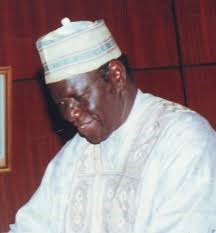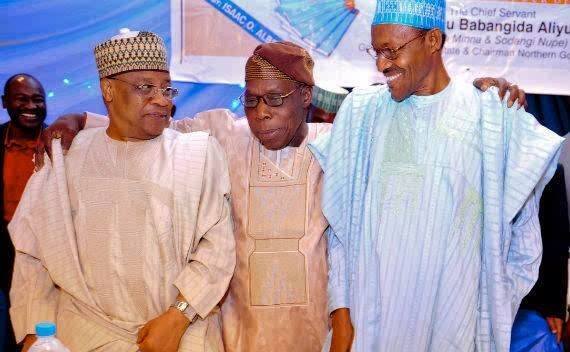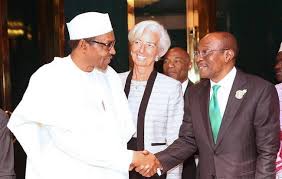
A Vanguard newspaper representation of the current discourse of privatisation

Dr Ibrahim Ayagi who was booted out for refusing to implement foreign exchange dictations

Time to go beyond discursive punching
Bongos Ikwue, the legendary musician, recently paraphrased the clincher that the only fight one ever wins is the fight one doesn’t get into. Many would say he was addressing the Nigerian power elite quietly in that intervention. Following from this, is it not about time everyone else – critics, hustlers, opportunists, lobbyists, careerists, regime ideologues, hero worshippers but, most importantly, Nigeria’s senior citizens adjust their individual and collective attitude to the Nigerian crisis? This crisis has been heightened by former President Obasanjo going public recently, thereby inviting the public to scrutinise his dissatisfaction with incumbent president, Muhammadu Buhari’s governance. But, that conflict has a long history, spanning the last thirty or so years.
It is the re-appearance of the same realities in the aftermath of the 1983 coup in which Buhari‘s integrity was relied upon to push out the Shagari government when the NPN caucus would not give in to the kind of devaluation the IMF was demanding. But after the coup, Buhari also stalled, uttering words to the effect that no nation devalued its currency and came out of it unscathed. He did add that the IMF infuriated every patriotic Nigerians with its conditionalities. That is the same position he has maintained in 2015 after being relied upon again to get Goodluck Jonathan out of power.
Of course, Buhari is correct to say so, both in 1983 and in 2015 except that he did not also proceed to add that the forces that he was used to overthrow in 1983, that is the rice merchants, sundry farmers and traders of 1983 and their ‘Form M’ politics have transformed into oil and sundry cabals in 2015. And that, in 2015, they are a much more formed and consolidated cabal around and about the jugular of the Nigerian economy. And that they have programmed him to fail. In that sense, this is not about Obasanjo against Buhari as such but Nigeria versus “accumulation by dispossession”. That is the name and nature of what is playing out. Of course, ‘accumulation by dispossession’ has its local representatives in intellectuals and practitioners of neoliberalism and of which the former president is, unarguably, the ultimate ideological godfather in Nigeria today.
Democrats would argue that everyone, former presidents and even plebeians, should be entitled the space to push their ideological convictions. The problem, however, is that neoliberalism has almost sniffed life out of Nigeria. Things have gotten out of hand. The elite as a whole and the government of the day were all warned that SAP would ruin Nigeria. Today, Nigeria is in ruins. The Casino capitalism that the IBB and successive regimes favoured or were compelled to favour has basically devoured the country. The late Professor Sam Aluko particularly warned that Obasanjo would ruin the economy. (See ‘Obasanjo Will Ruin the Economy’, The News, February 23rd, 2004). Today, the economy is in ruins. Typically, all such people who acted out such opposition were ruined or nearly ruined. Dr Ibrahim Ayagi has been out of public arena. Before he died, Prof Aluko was pronounced senile by Obasanjo. And, according to Nasir el-Rufai, the effervescent governor of Kaduna State and a self-satisfied expert in public auctioning of national assets, recently told the world how Obasanjo sacked Haruna Elewi, his then Minister of Communications for Elewi’s reported disinclination to the auctioning of NITEL. Today, we may not know how many more individuals, institutions or voices are marked on ‘their’ list to be blackmailed, excluded, denied their own dues or deliberately misrepresented but they can never be God.
The sad dimension is how, either unclear and/or dazed by them, the president, for example, adopts policies they have promoted, thereby alienating himself more and more. It is such that having been facilitated into power, he has been settled but, embedded in that power are policies that compel the masses and the middle class to fight him. That makes Buhari a classical case of those who were good only to go into government to become bad. Obasanjo put it in a way that must interest Buhari in the Akintola Williams Lecture where he said that what one gets to know when one is inside government could be vastly different from what one thought one knew when one was outside. It is the grandmaster’s own way of wondering what Buhari might have thought he was brought to government to do.
This is where President Buhari compounds his predicament by reducing the problems his regime faces to sabotage by people suspected to be corrupt. That could be one dimension of it but global finance is also implicated. The ease with which the recent proposal to sell remaining national assets was defeated by cross-cutting voices in the NASS shows how local agents of global finance are the least popularly located for any sustainable test of strength but that is if Buhari were himself popularly located. Suspicious and disdainful of politics, he is so aloof from national scale conscientisation of the constituencies that would be so vital to a test of strength. And he pushes on with an anti-corruption war that is great in principle but which does not even address the cabals as a threat. It is not surprising that the president’s fortune has dwindled so fast. Someone said recently that the president would be lonely in 2019. He should have said the president is already so lonely, lonely in a huge crowd, at both the level of the popular masses where the suffering is much as well as at the level of the elite. It is not clear if he reads the strategy as such: Having been facilitated to power, he has been settled. But having been programmed to fail, he is embattled. He says he is guaranteed to defeat those he suspects but what might defeat mean in a war of attrition?
This paper stands by its earlier call on the president to fall back on a government of national unity. He needs to borrow something from the late General Sani Abacha – the comprehensiveness of the inclusivity of that regime’s initial cabinet which enabled it to take off creditably. It is arguable if that regime would not have been better off if it retained that cabinet much longer. All the viable tendencies in the country were represented in that cabinet and it spoke to the requirement of good governance in Nigeria: a cabinet not made up of little minds imprisoned in journeys of self-discovery at the expense of popular aspirations.
President Buhari has nothing to lose by coming back to the people. At the moment, he has been taken too far, too quickly from the people. Taking on vested interests but doing so without consolidating the most popular fronts looks like an invitation to outright defeat. His perceived reliance on insiders of the labour movement to undermine labour unity is something he is bound to regret in any test of strength. Deregulate the economy by all means. Let hundred flowers bloom in private enterprise but do not allow free market economy to mean free rein for investors who brought no expertise, finances or technology from anywhere but rather mopped up local resources to purchase well established state enterprises which they abandon few years thereafter. That is neither deregulation nor free market economy but swindling and it shouldn’t be happening under Buhari. And who else but labour can help fight this off?
But even while all these go on, there is a gap that would be beautiful to explore. IBB, Obasanjo and all the former heads of government, their deputies and principal actors who, collectively, implemented policies that foregrounded the current crisis are all around. Why is a discussion session with them not part of the game? Why is a resolution of a parley between senior citizens and the incumbent not part of the menu? This is not the same thing as informal chit chat, camaraderie or Old Boys networking but a publicly held meeting that will help reassure the citizenry that the current crisis is being discussed by the collection of the most involved elements in the society. Those who might be infuriated by the idea of calling any set of people senior citizens in a republic might want to come to terms with the fact that there are, indeed, senior citizens.
Theoretically, the ultimate challenge really is for the Nigerian voters to decide the question of business model once and for all in 2019. If they vote for a hard headed, informed and sophisticated statist, the four years of such a president would have settled the question of business model in Nigeria to the chagrin of local agents of global capital. If it is otherwise, instability will continue in Nigeria because global capitalism is already in deep crisis even in its heartlands in Europe and North America. This is something to be pursued, especially by the northern power elite because, being the most agrarian and, therefore, the most fragile in the chain, northern Nigeria would suffer most from that instability, including the risk of disintegration into anomie should neoliberalism consolidate. As both the PDP, the APC and anticipated new political parties are sticking to the zoning principle and, therefore, picking all their presidential candidates from the north, the region has an opportunity to influence the emergence of the most qualitative candidates in all the parties in 2019 with particular reference to the guarantee of mixed economy model. That way, the constant tension between powerful, intrusive enthusiasts of freewheeling neoliberalism such as Obasanjo and their rather hesitantly statist brethren such as Buhari would have been eliminated from Nigerian politics.
No options, however, nullifies a summit of senior citizens over a disagreement that has defined the last three decades of Nigerian politics whose current phase is former president Obasanjo’s disagreements, key among them being Buhari’s blame game politics, the inclusiveness profile of the regime and the question of the government’s strategic vision, especially as it concerns the management of the economy. It is well and good to note that if this is not conflict, then nothing else is. And that, as everybody in Nigeria and as Nigeria’s well wishers across the world know that what General Obasanjo says as well as what he does matter a lot, we, therefore, pray to God to guide the former president to follow the example of his peers in Nigeria and elsewhere in deliberately limiting his public roles to advisory range and to be more restrained and less intrusive when he comments at all. Otherwise, when he says all he has come to know by virtue of the privilege of his rich experience of the inner sanctum of power, he can set in motion a chain of reactions beyond what he might have intended. It can never be trite to say that Nigeria is so diverse and what one speaker might take as a straight forward point could mean a completely different thing to the next person. Fundamentally though, the conflict goes beyond Obasanjo and Buhari as individuals. The fear that Obasanjo is now fighting the government for one reason or the other may well be true. But the fight is a historical squaring-up that has enveloped the Nigerian polity since the early eighties. Doesn’t this need think tanking at the level of this particular set of Nigerians at this point?




























